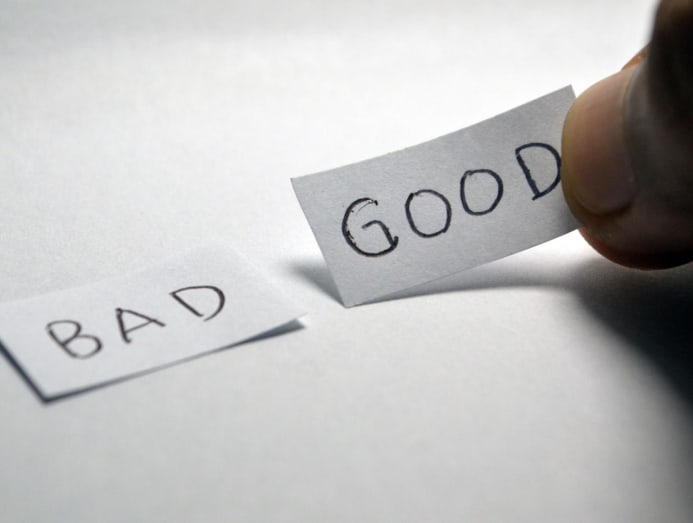Commentary: Black or white? Wrong or right? Don't rush to take sides on complex issues such as Israel-Hamas conflict

Subjectively analysing any major issue as being comprised of just two diametrically opposed sides does not give due recognition to life’s complexities.
While responses to the Israel-Hamas conflict have been bitterly divided, they showcase a common phenomenon of people viewing complex situations in black-and-white terms. But how did we get here?
ONCE UPON A TIME…
As children, we heard bedtime stories with calming narratives of ‘good’ vs ‘bad’, and clear signposting for which side to celebrate. Fables and folklore were crafted and circulated to reassuringly convey conventional values like filial piety and general good behaviour.
In a religious household or school, these tenets were reinforced with overtones of divine approval.
Quite understandably, we would conflate the stories’ tangential details with the central moral messaging. The evil witch is ugly. Heroes are well-groomed. The thief has poor grammar. The good cowboy wears a white hat.
We were, unconsciously, cultivating biases.
From the simplified tales in TV shows and games, we quickly learnt to think about morality and conflicts in binary ways. Equipped with a narrow set of values, we confidently decided who was right and wrong.
From here, it was a smooth transition to ascribing good qualities to our chosen side. At school, we cheered for our assigned team. A loss would see us arguing that we were denied a win by a partial referee, or that the other team cheated.
These are time-tested, time-honoured ways to train and socialise us from youth to choose and support the ‘right’ side.
Within the confines of such a structure, the takeaway lessons were:
1. Any situation involving conflict can be seen as a definitive distinction of right and wrong.
2. I have been taught to identify with the ‘right’ side; therefore, the other side must be ‘wrong’.
BLACK-AND-WHITE ATTITUDES IN A KALEIDOSCOPE WORLD
In navigating the complex adult world, the mind’s muscle memory effortlessly compels us to fall back on childhood methods by curating nuanced events into “good” and “bad” ledgers. Polarising complicated details seems an efficient way to manage our thoughts and responses.
Curiously, this kind of black-and-white reasoning persists even as we recognise that our own identities are richly multi-faceted — none of us are solely one thing, but rather a sum of societal, cultural and many other elements that confer upon us a unique life story.
Yet we retain childhood’s fervour for identifying two sides in any situation — the uniformly good and the uniformly bad.
In what psychologists call “fundamental attribution error”, we reduce the complex reasons for others’ behaviour to crude stereotypes of their character: All criminals are thoroughly villainous; the person with non-conformist political views is hell-bent on destroying society; the new immigrant is out to steal jobs.

THE POTENTIAL IMPACTS OF SIMPLIFIED DECISIONS
Even once we’ve moved out of the controlled scenarios of childhood into the adult world, we are still programmed to identify and support the “right” side in any conflict.
This is harmless in the schoolyard, and jolly good fun at the football stadium. But in every other domain, there are many potentially dangerous repercussions:
1. Subjectively analysing any major issue as being comprised of just two diametrically opposed sides, then justifying one side while demonising the other does not give due recognition to life’s complexities. As a result, we can neglect others’ livelihood, their emotional, mental and physical well-being, and other basic human rights.
2. The politics we favour will affect the world we bequeath to the next generation, and the resources we choose to allocate for their education and other needs.
3. Polarised thinking misaligns our moral compass. In 2021, asylum seekers fleeing to the United Kingdom from their home countries tragically drowned in the English Channel. Journalist Ed McConnell wrote about readers who had coldly responded to the original report with a laughing emoji. They had never met the victims, yet had felt justified in reducing their complex economic and sociological issues to a simple conflict between Us and Them.
4. The gateway to destructive action against any group or community is the willingness to allow Us-Them thinking to take root in our minds. Law professor Gregory Stanton explains: From the mentality that “they” are simply the opposite of “us” can spring the idea that it is acceptable to ignore their views, treat “them” worse, and wish (or even enact) harm upon “them”. The situation is worsened by echo chambers, both online and off, that affirm our mental polarities.
5. We become unaware of our own inconsistencies. Most people would rightly denounce the concepts of racism, xenophobia and bigotry. Yet, in the same breath, many would also condemn discussion about LGBTQ+ issues, voting rights, tax breaks and so on as threats to societal values or personal safety. This attitude can quickly escalate into diverse types of centrism based on race, religion, culture and more.
STAYING TRUE
All this is not to say that we should not stay true to vital principles. Some things must be universally condemned, such as terrorist violence.
Even so, public discourse ought to include broader, deeper discussion about related or even seemingly peripheral issues. Surely, to fight terrorism effectively, we need to understand the root causes that let it fester.
While we unequivocally denounce terrorism, we should also have reasoned conversations to agree on shared values and rules (both legal and secular) without being suspected of moral compromise or appeasement.
As the Ministry of Foreign Affairs recently pointed out, there are laws and principles to be followed even when responding to unlawful violence.
STAY VIGILANT
Us-Them thinking enables incremental animosity, aided and exacerbated by the confusing cacophony of misinformation competing for our attention.
As the Israel-Hamas conflict rages on, TikTok, for instance, has drawn widespread criticism for failing to remove posts spreading falsities about alleged atrocities.
CNN has been falsely accused of staging a scenario when reporting about the same conflict. Ironically, at the same time, a CNN reporter has apologised for inadvertently passing on misinformation about heinous brutalities against babies, as claimed then denied by the very same government sources.
How easy it is to weaponise misinformation and ignorance.
Locally, we have also seen WhatsApp exhortations that cunningly reference religion to urge readers to “stay vigilant”. The insinuated subtext appears to be that some groups in Singaporean society are to guard against other groups with different backgrounds and beliefs — creating distrust through methods akin to hate speech.
The legal philosopher Jeremy Waldron spoke of hate speech as “an environmental threat to social peace … a slow-acting poison”. Like a single smoke-spewing car adds to air pollution at large, each unkind or spiteful message contributes bit by bit to a massive problem.
Let us maintain social peace as a public good by staying vigilant against disinformation, against divisive thoughts and actions, and against anyone’s urging to destroy or do harm.
Stay vigilant against Us-Them thinking. It was to this end that Singapore’s Chief Rabbi and Mufti reaffirmed solidarity between their different communities.
Stay vigilant for opportunities to help those who need help. First and last, do no harm. Better yet, do good.
ABOUT THE AUTHORS:
Ong Siow Heng is Professor of Communication Management Education at the Lee Kong Chian School of Business at Singapore Management University. Benjamin Joshua Ong is Assistant Professor of Law at the Yong Pung How School of Law at Singapore Management University.








